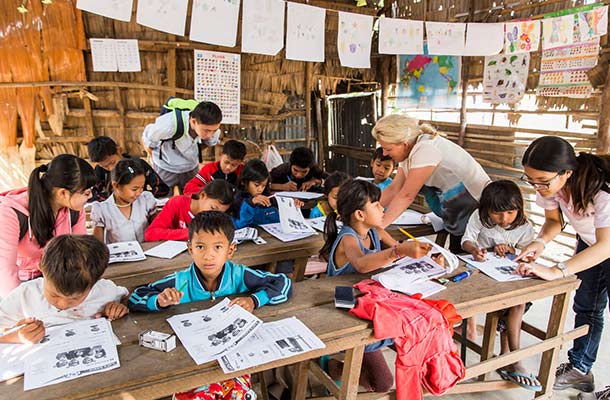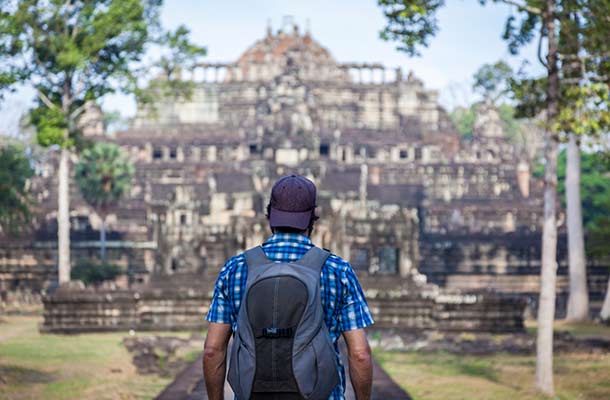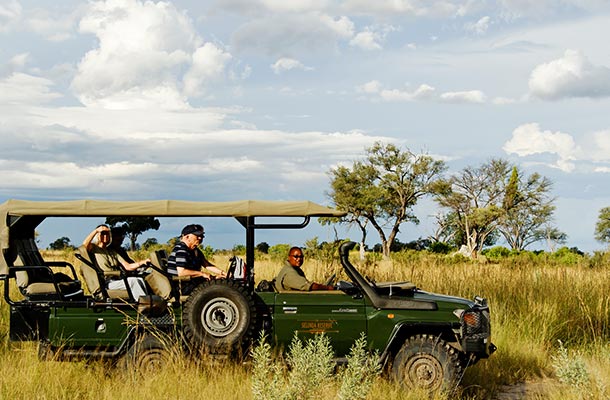Voluntourism in Cambodia: What to Consider Before Going
Keen to volunteer in Cambodia? Ask yourself these 6 questions before you go!
 Photo © iStock/Yongyuan Dai
Photo © iStock/Yongyuan Dai
- Cambodian Volunteer Tourism
- Things to Consider
- The Impacts
- Ask Yourself these Questions Before You Go
Cambodian Volunteer Tourism
‘Voluntourism’ has sprung into action over the last few years and Cambodia is no exception. Siem Reap in particular is host to a number of trendy volunteer hang-outs which have blossomed alongside the growth of volunteer experiences on offer. The term ‘voluntourism’ is a clever play on words that has both positive and negative connotations. Some love the concept that whilst on holiday you can offer some time to give something back to the communities you are visiting. Others, however, recoil in its distaste that volunteers should pay for giving up their time and expertise to help those in need.
Despite your personal choice of words to depict volunteering whilst away from home, the growth of volunteer tourism has exploded during recent troublesome economic times allowing for individual life enrichment, CV cultivation and an opportunity to take time out to contemplate their role in the world.
The Considerations
Whether volunteering is meeting up with fellow ‘volunteers’ every night on Siem Reap’s popular Bar Street to share personal experiences or really providing something of significance to the local communities is only something the individual can answer. It is, however, really up to the individual and the host organization to provide a win-win-win situation to fulfill and satisfy the individual’s own needs to volunteer and to really benefit and strengthen the long term needs of the project you are supporting.
In my opinion, this can be achieved, but only with careful consideration, screening and application. And, yes, perhaps you even want to pay an organization to provide you with the relevant information you need to make informed choices of where your expertise will be best suited.
It is, of course, possible to arrange your own volunteer placement and many organizations are crying out for help and assistance, but without considerate research - can you really be sure the organization you are assisting really is benefitting from your presence? Have they asked enough relevant information about you? Did you provide them with a current and up to date CV and police checks? Have they asked you to sign child protection policies and clearly outlined what they expect from you?
One piece of advice is to use a bit of common sense and relate this scenario back to your home country and whether you as complete stranger would be allowed into a children’s home to hug children or walk into a school and hand out books.
Beneficial volunteering requires organization, time and commitment to one project where your skills can enhance an organization and not pull on all their resources over a short time frame. Ideally, long-term volunteer stints should commit to a least 6 months or a year and at a minimum of three months.
Anything shorter and one should question the actual impact on the organization and, more importantly, especially kids attachments. Only specialist volunteers should consider short-term placement where the exchange of knowledge is key.
If you really want to help, you might want to consider whether spending your time fundraising and creating awareness for an established, well functioning organization can assist better in the long-term rather than a few days teaching English.
In our experience, it often takes a couple of weeks to settle in to the culture and get into the swing of things. For unskilled, short-term volunteers, by the time they are comfortable with what they are doing they are off home again - which brings up the question if it is really fair to put extra work and pressure on the project managers as they continually would have to train new short term volunteers before they leave back home? It is also important to ask what help can really be done? And realistically what can be achieved?
The Impacts
The term voluntourism has recently come under extreme criticism. It has been linked with the demand for orphanage tourism and this has significantly contributed to the number of children going into institutionalized care. Some package tours include afternoons at a local orphanage or school promoting this as worthwhile for the children. This is in general discouraged and whilst playing with little children and teaching English at a local school perhaps springs to mind when discussing the term voluntourism – there are areas in genuine need such as basic healthcare, advanced exchange of knowledge and skills, teacher training, marketing, business management, IT which are skills that are key in a developing country. It’s also important NOT to take away jobs from locals when employment is high in demand and rather pass on skills and knowledge where it is needed.
However, in my opinion skilled volunteering can and will offer a rewarding travel experience and if managed well benefit individuals and projects in the long term. In responsible tourism terms, voluntourism does encourage guests to stay longer, stay locally and interact with communities.
Keen to Volunteer in Cambodia? Ask Yourself these Questions Before You Go:
- How much will this organization benefit?
- Is this just satisfying my needs?
- Are the kids well looked after?
- Has the organization just let you (a stranger with no official paper work) walk straight into an environment with vulnerable at risk children without asking for references or police checks?
- What contact have you been given?
- If you pay for it – how much actually goes to the project you have worked at?
About the Author
Jo Owen works for Angkor Hotels and is passionate about responsible tourism and highlighting places that get it right. Working in Siem Reap she constantly weighs up how double-edged tourism can make giant positive steps in impacting the local economy and communities, but equally can leave large negative footprint on the environment if not managed properly.
Related articles
Simple and flexible travel insurance
You can buy at home or while traveling, and claim online from anywhere in the world. With 150+ adventure activities covered and 24/7 emergency assistance.
Get a quote

No Comments